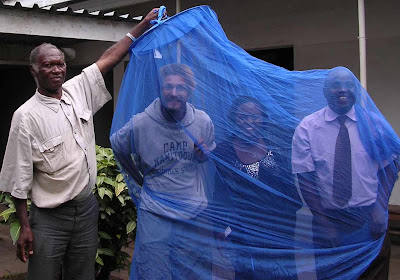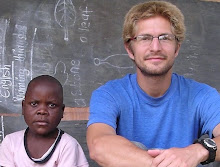Hello, ZP people. In an effort not to mislead anyone about the nature of development, I wrote an essay about some of the darker realities that I don't put in my e-mails. It's for you, for your understanding:
ZP: The Dark Side
One of the most important components of sustainable development is understanding. You can’t help someone to make positive changes that will last if you don’t put in the time to learn what’s really going on with him/her. It’s been my goal that you all could at least get a glimpse of what their lives are like over here, in the interest of helping to educate us all about the plight of the poor.
Unfortunately, sometimes, since I’m also trying to wheedle money out of ya, I do what most aid agencies do: I tell about the needs with cuteness and optimism to make everyone feel like it’s a simple matter of giving money to good people and things will change. I’ve realized of late that this kind of approach leaves you with a critically inaccurate picture of what really goes on and just how tough this whole game is.
Hence the title of this little note, “The Dark Side.” Too many people fail to realize how deep and widespread the problem is (indeed, thousands and thousands of well-intentioned Westerners have marched into Africa and done more harm than good for that very reason), and I feel that I would be doing you a disservice if I didn’t make an effort to convey that.
Countries like Malawi aren’t just economically poor, they’re spiritually, mentally, and physically poor—because poverty has a way of creeping into everything, like a cancer. Someone you consider a close friend could stab you in the back easily, for the sake of money. Many a volunteer here has a story of someone they trusted, or even worked with for over a year, who outright robbed them. The man who founded one of the orphanages I’ve been working with, a Malawian man respected in the community, ended up sexually abusing the orphans and staff, stealing money, and other perpetrating other offenses I won’t list. The co-founder of a particular school I visited, who owns the land on which it’s built, recently chopped down a huge mango used for meetings, shade, and play, simply because he was feeling slighted by one of the workers and wanted to assert his authority (He claimed it was for firewood, but trees are plenteous in that area.) One week ago the water spigot at the orphanage was stolen. The water spigot. So the kids didn’t have water because someone wanted the extra dollar or two he might get from selling the spigot. If a door hinge breaks or the map of Malawi gets accidentally torn and falls lopsidedly to the ground, someone almost never lifts a finger to fix it. People aren’t taught to maintain or take pride in things they own, either individually or collectively, so most things are in a perpetual state of falling into disrepair. This has proven true with locations I’ve visited like the large Chiradzulu hospital, donated by the EU, that administers quality health care. Unfortunately, several machines have stopped working and no one will fix them, though they aren’t difficult to repair. In ten or twenty years, as someone on my visit commented, without regular visits from donors and work teams, the hospital will needlessly fall apart due to a lack maintenance. Similarly, if you introduce a helpful concept, like “permaculture” in one location where a Swiss friend of mine is working—a practice whereby you can increase your crop yields, manage the land better, and maintain the ecological balance—most of the time the villagers will only adopt the concept as a novelty to humor you, and when you leave or try to shift the responsibility to the locals they’ll abandon it. It happens all the time.
Not to be a downer, but that’s only the beginning. There’s child abuse, a general delusion about what causes AIDS, corruption that helps the rich get richer, and the list goes on. I could start in on how many of Africa’s problems come from Westerners who plundered natural resources, trafficked and sold slaves, and imposed a culturally arrogant version of Christianity etc., but we’d be here all night.
Concerning ZP affairs, things haven’t been failing by any means, but I feel it would be remiss not to mention a few foibles: The sugar cane press project unfortunately had to be abandoned in favor of selling the materials for a good price. Due to a series of events typical of Malawi (I was stood up 3 times in a row by the same man who said he would sell us his freezer but then never did, the supply of sugarcane ran out, and other things took longer than they should have), we came to a point where I knew the project won’t be up and running by the time I leave in February—and that’s a recipe for disaster. At the same time, someone offered us a very good price for the materials whereby we can make a small profit, and they will benefit from our experience and use the press for and worthy project in Zomba, a town not far from Blantyre. It’s disappointing, of course, but it’s always necessary to cut one’s losses and be realistic when the situation calls for it. The money we’ve gotten out of the sale will help to pay for a few necessary rainy-season supplies for the orphanage and/or a smaller, more manageable income-generating project.
One week after Pastor Tembo and company got the farm equipment for New Jerusalem Food Farm, he visited again to ask for money for seeds and fertilizer. I’d told them that the ZP was not going to provide money for ongoing needs and perishables, and that they shouldn’t think that we were going to “fund” them in any way. They’d done beautiful, if modest things without any outside help, and I didn’t want to interfere with that spirit. Still, it seems that their notion that they’d “scored” in finding a white donor led them to start thinking in that old, codependent way. Hopefully my refusal of his request, cold though it may seem, can nip that in the bud.
Overall, the message is that no gift is perfect, and real development requires immense patience, longsuffering, and simplicity of heart. And none of us, including me, have earned the right with our giving to think we don’t still bear a great weight of responsibility to seriously contemplate our role in a world where the situation of the poor just isn’t improving and our habits and lifestyles as the world’s rich are contributing to it. I’ve intended with this message not to point out how lazy or irresponsible the poor in Malawi (or me, for that matter) are, but to make sure that you can, vicariously and as clearly as I’m able to convey, get a more well-rounded view of whom you’re helping and how—sort of like getting the Cliff’s Notes on a few of the hard lessons I’m learning, so that I don’t feel like I’m the only one benefiting from them.
And please don’t feel disheartened. I still feel good about the gifts we’ve given—it’s much harder to go wrong when you invest in education and in hardworking people who already have their own projects underway. And, it’s always worth the hassle and heartache to continue striving towards the goal—and I say that as much to hear it myself as to tell it to you.
Thanks for reading. As always, if you want to know more, I’m happy to answer questions.
Peace,
Adam












